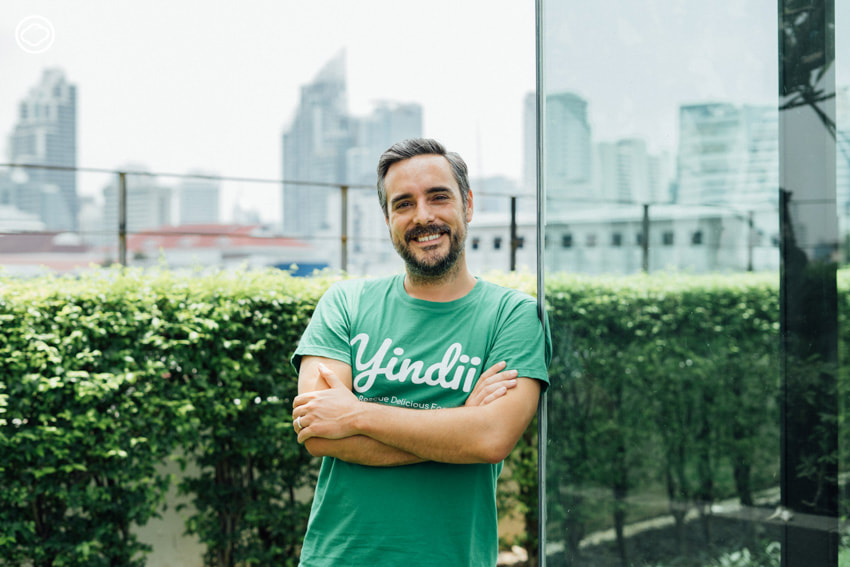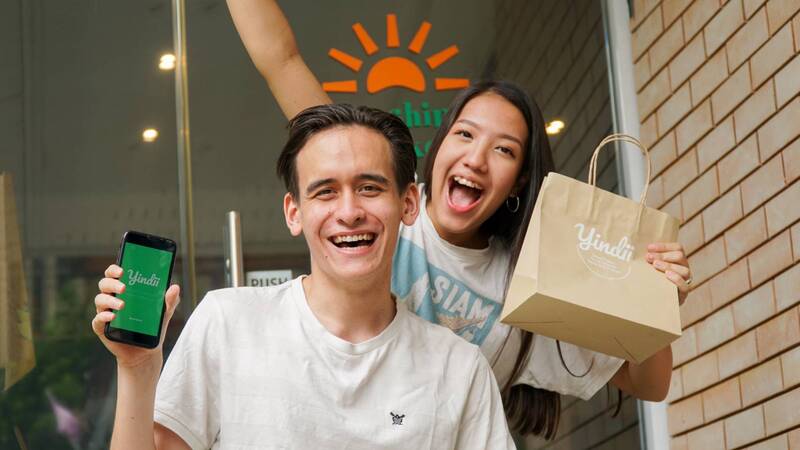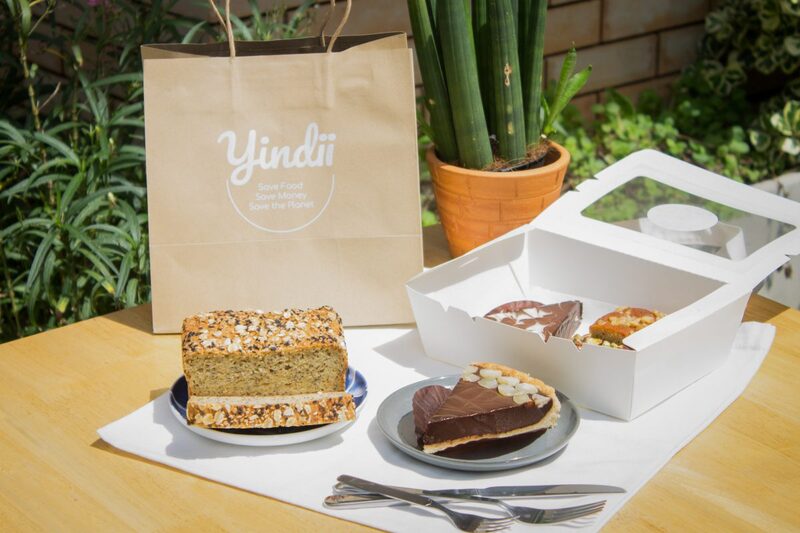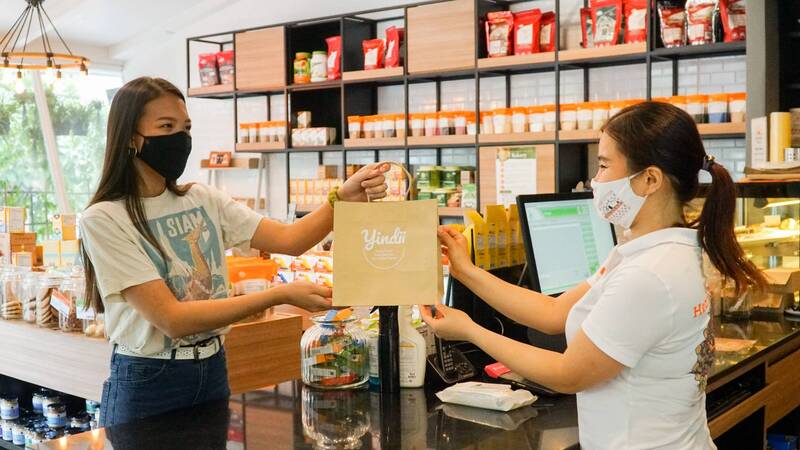Every day, mountains of unsold food are thrown away by Bangkok restaurants, bakeries, hotels, grocers, cafes and supermarkets. It’s not only a terrible waste of valuable nutrition at a time when so many people in today’s world are going hungry, but it’s also damaging the environment.
What can be done to change this appalling situation?
One very enterprising team based in Bangkok believes they have the answer. It’s called Yindii, a start-up delivery service that ‘rescues’ food before it’s thrown in the trash at the end of the day. It’s then repackaged in a ‘surprise bag’ of high quality goodies that’s sold on to customers via an app for up to 70% of the normal price.
Less waste and extra revenue for food sellers – and bargain meals for hungry eaters. It’s a win-win situation.
The creative mind behind Yindii is 35-year-old Louis-Alban Batard-Dupre from Paris who landed in Thailand three years ago after a successful career in start-ups in Europe and America. The idea came to him while volunteering for SOS, a food waste rescue charity. It was an experience that crystalized his thoughts on today’s throwaway society and its impact on the environment.
“Around 33% of all food produced worldwide is wasted or lost every day, creating a carbon footprint, and cutting short our lives on this planet,” says Louis. “That is close to a billion and a half tons that is never consumed, accounting for 10% of the greenhouse emissions around the globe, four times more pollution than the airline industry. Someone somewhere is losing money, while people elsewhere are starving.”
Yindii works in Thailand with more than 150 partners, says Louis, including a number of major hotels like Hyatt Erawan, JW Marriott, Centara Grand, Movenpick, SO/Bangkok and Sofitel Sukhumvit; major supermarkets like Tops and Gourmet market; as well as premium food brands like Mandarin Oriental shop, Landhaus Bakery, Tiengna and Paris Mikki.
When these partners have boxed the surplus food at closing time, they contact Yindii which in turn announces them in its daily ‘Happy Hour Deals’ via its app.
The actual contents of the ‘surprise bag’ are only revealed when it is opened. This may sound like something of a gamble but with almost 40,000 Yindii customers since its launch a few months ago, it seems to be paying off.
“Although you can’t tell precisely what you’re going to get in the bag, the store will indicate whether it contains fruits, vegetables, baked goods, pastries or even a meal,” says Louis. “It feels like a surprise gift when you receive the bag!”
There’s also no telling in advance what Yindii’s partners will be offering in their daily ‘Happy Hour’ deals.’ ”It changes every day,” he says. “What's important is to be sure that,
as a customer, you'll receive perfectly good food. If you're satisfied with the surprise bag, there's a high probability you will come back to this sustainable store"
Customers can collect their Yindii bag from the restaurant or the shop themselves, or arrange to have it delivered.
With certain stores already proving more popular than others, eagle-eyed customers watch out for Yindii’s announcements to make sure they are first in the queue to place an order. “You definitely need to fight for some boxes – it can be very competitive,” says Louis, adding that the most successful partners are usually bakeries as they give really high value for money as they have no other alternative than throwing it away.
ouis admits that his venture faces a challenge with Thai consumers who view food waste as something dirty, or that leftover food somehow suggests a company is not successful. “We need to change that mentality. Waste is not waste until you waste it” He would also like to see a change in Thailand’s food waste laws, emulating countries like France which forbids retailers from throwing away leftover food and forcing them to donate it instead to charities.
It’s still early days for Yindii, but Louis believes it can be replicated in other countries. “It has the potential to become one of the world’s most successful anti-food waste ventures.”
www.yindii.co
What can be done to change this appalling situation?
One very enterprising team based in Bangkok believes they have the answer. It’s called Yindii, a start-up delivery service that ‘rescues’ food before it’s thrown in the trash at the end of the day. It’s then repackaged in a ‘surprise bag’ of high quality goodies that’s sold on to customers via an app for up to 70% of the normal price.
Less waste and extra revenue for food sellers – and bargain meals for hungry eaters. It’s a win-win situation.
The creative mind behind Yindii is 35-year-old Louis-Alban Batard-Dupre from Paris who landed in Thailand three years ago after a successful career in start-ups in Europe and America. The idea came to him while volunteering for SOS, a food waste rescue charity. It was an experience that crystalized his thoughts on today’s throwaway society and its impact on the environment.
“Around 33% of all food produced worldwide is wasted or lost every day, creating a carbon footprint, and cutting short our lives on this planet,” says Louis. “That is close to a billion and a half tons that is never consumed, accounting for 10% of the greenhouse emissions around the globe, four times more pollution than the airline industry. Someone somewhere is losing money, while people elsewhere are starving.”
Yindii works in Thailand with more than 150 partners, says Louis, including a number of major hotels like Hyatt Erawan, JW Marriott, Centara Grand, Movenpick, SO/Bangkok and Sofitel Sukhumvit; major supermarkets like Tops and Gourmet market; as well as premium food brands like Mandarin Oriental shop, Landhaus Bakery, Tiengna and Paris Mikki.
When these partners have boxed the surplus food at closing time, they contact Yindii which in turn announces them in its daily ‘Happy Hour Deals’ via its app.
The actual contents of the ‘surprise bag’ are only revealed when it is opened. This may sound like something of a gamble but with almost 40,000 Yindii customers since its launch a few months ago, it seems to be paying off.
“Although you can’t tell precisely what you’re going to get in the bag, the store will indicate whether it contains fruits, vegetables, baked goods, pastries or even a meal,” says Louis. “It feels like a surprise gift when you receive the bag!”
There’s also no telling in advance what Yindii’s partners will be offering in their daily ‘Happy Hour’ deals.’ ”It changes every day,” he says. “What's important is to be sure that,
as a customer, you'll receive perfectly good food. If you're satisfied with the surprise bag, there's a high probability you will come back to this sustainable store"
Customers can collect their Yindii bag from the restaurant or the shop themselves, or arrange to have it delivered.
With certain stores already proving more popular than others, eagle-eyed customers watch out for Yindii’s announcements to make sure they are first in the queue to place an order. “You definitely need to fight for some boxes – it can be very competitive,” says Louis, adding that the most successful partners are usually bakeries as they give really high value for money as they have no other alternative than throwing it away.
ouis admits that his venture faces a challenge with Thai consumers who view food waste as something dirty, or that leftover food somehow suggests a company is not successful. “We need to change that mentality. Waste is not waste until you waste it” He would also like to see a change in Thailand’s food waste laws, emulating countries like France which forbids retailers from throwing away leftover food and forcing them to donate it instead to charities.
It’s still early days for Yindii, but Louis believes it can be replicated in other countries. “It has the potential to become one of the world’s most successful anti-food waste ventures.”
www.yindii.co





 RSS Feed
RSS Feed
















